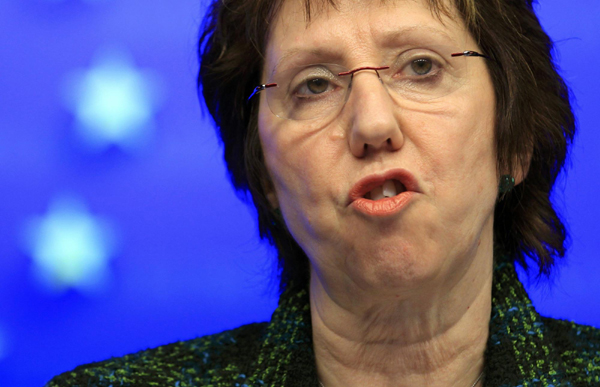
|
 |
|
EU foreign policy chief Catherine Ashton holds a news conference at the end of a European Union foreign ministers meeting in Brussels January 23, 2012. The European Union banned imports of oil from Iran on Monday and imposed a number of other economic sanctions, joining the United States in a new round of measures aimed at deflecting Tehran's nuclear development program. [Photo/Agencies] |
TEHRAN/BRUSSELS - Iran accused Europeans on Monday of waging "psychological warfare" after the EU banned imports of Iranian oil, joining the United States in new sanctions aimed at preventing Tehran from getting nuclear weapons.
The Islamic Republic, which denies trying to build an atom bomb, scoffed at efforts to choke its oil exports. Some Iranians also renewed threats to stop Arab oil from leaving the Gulf and warned they might strike US targets worldwide if Washington used force to break any Iranian blockade of a strategically vital shipping route.
Yet in three decades of confrontation between Tehran and the West, bellicose rhetoric and the undependable armoury of sanctions have become so familiar that the benchmark Brent crude oil price edged less than 0.5 percent higher, and some of that was due to unrelated currency factors.
"If any disruption happens regarding the sale of Iranian oil, the Strait of Hormuz will definitely be closed," Mohammad Kossari, deputy head of parliament's foreign affairs and national security committee, told Fars news agency a day after US, French and British warships sailed back into the Gulf.
"If America seeks adventures after the closure of the Strait of Hormuz, Iran will make the world unsafe for Americans in the shortest possible time," Kossari added, referring to an earlier US pledge to use its fleet to keep the passage open.
The United States, which imposed its own sanctions against Iran's oil trade and central bank on Dec. 31, welcomed the EU move, as did Israel. It has warned it might attack Iran if sanctions do not deflect Tehran from a course that some analysts argue could potentially give Iran a nuclear bomb next year.
US Secretary of State Hillary Clinton said in a statement with Treasury Secretary Timothy Geithner: "This new, concerted pressure will sharpen the choice for Iran's leaders and increase their cost of defiance of basic international obligations."
Calls for Talks
Germany, France and Britain used the EU sanctions as a cue for a joint call to Tehran to renew long-suspended negotiations on its nuclear programme. Russia said talks might soon be on the cards.
Iran, however, said new sanctions made that less likely. It is a view shared by some in the West who caution that such tactics risk hardening Iranian support for a nuclear programme.
European Union foreign ministers who agreed an anticipated ban on imports of Iranian crude at a meeting in Brussels were so anxious not to penalise the ailing economies of Greece, Italy and others to whom Iran is a major oil supplier that the EU embargo will not take full effect until July 1. And the strategy will be reviewed in May to see if it should go ahead.
Curbing Iran's oil exports is a double-edged sword, as Tehran's own response to the embargo clearly showed.
A member of Iran's influential Assembly of Experts, former intelligence minister Ali Fallahian, said Tehran should respond to the delayed-action EU sanctions by stopping sales to the bloc immediately, denying the Europeans time to arrange alternative supplies and damaging their economies with higher oil prices.
"The best way is to stop exporting oil ourselves before the end of this six months and before the implementation of the plan," the semi-official Fars news agency quoted him as saying.